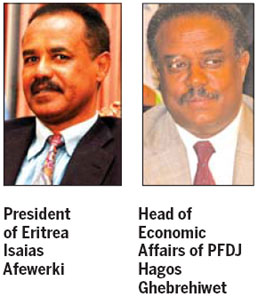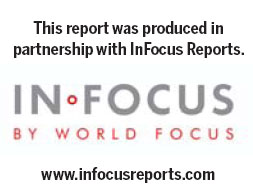Eritrea Special
Sino-Eritrean trade ties strengthened
(China Daily)
Updated: 2010-10-15 08:18
 |
Large Medium Small |
Blessed with large deposits of precious minerals such as gold, silver, copper and zinc, Eritrea offers foreign investors a wealth of opportunities in the mining sector, while the agriculture, tourism, fisheries and manufacturing industries also possess huge potential.
President Isaias Afewerki is determined to transform Eritrea into the Horn of Africa's logistics hub, as the country of 5.6 million people capitalizes on its 1,151-km long Red Sea coastline and access to one of the world's busiest trade and shipping routes.

As the African nation's preferred commodity partner, China is playing a key role in Eritrea's socioeconomic development through the supply of aid, capital, machinery, technology, knowledge and skills.
Chinese enterprises and equipment are also widely involved in the rebuilding of vital infrastructure such as roads, airports, power and telecommunications, schools and hospitals.
"Our priority has been the creation of a good climate for investment and development," said Afewerki, who took office in 1993 as head of the People's Front for Democracy and Justice (PFDJ).
"Eritrea can be a gateway for investment in Africa if we can take advantage of our excellent strategic location. Our partnership with China, even though it is in its early stages, will dramatically change the reality in this country and give us a greater global interaction."
According to the president, the mining, fisheries and agricultural sectors, especially cotton production, are best suited for Chinese investment as they will utilize the country's natural resources and generate substantial exports revenues.
"The potential for cotton cultivation is huge and a key part of our agricultural program is the introduction of new technology," he said.
"We are developing our agricultural infrastructure and, in partnership with China, are developing a textile industry. The initial commitment with China for cotton exports is already in place. We have begun with very modest programs but we need to expand them."
Tightening bonds
Chinese Ambassador to Eritrea, Li Liansheng, has welcomed these and other positive developments as he looks to strengthen these political, commercial, industrial and social bonds.
"The Eritrean government is trying to invite Chinese companies to make Eritrea a trading and transportation center for Chinese goods," he said. "There is particular potential and interest for Chinese companies in Eritrea's strategic location at the gateway to the vital trade and shipping route on the Red Sea."
A core pillar of Eritrea's modern economic policy is the setting up of new free trade zones that will generate fiscal growth, create jobs, boost government revenue and raise the country's profile on the global stage.
With a strategic location on international shipping lanes, Eritrea offers exporters and investors easy access to foreign markets, with up to 40,000 cargo ships a year - carrying some 700 million tons of cargo - passing close to its coast.
In order to capitalize on these commercial opportunities, Eritrea is building a series of modern free trade zones comprising factories, warehouses, offices, roads, airports and transport facilities. The first free trade zone will commence operations shortly at Massawa after the government invested millions of dollars in the transformation of 5,000 hectares of land next to a former naval base.
Chinese enterprises are among the foreign firms that will be based there and benefit from a tax-free environment in which no direct or indirect taxes are paid on sales or profits.
A second facility at Assab will open later this year and officials have plans for similar developments across the country, including one focused on agro-businesses near the border with Sudan.
The 'multiplier' effect
According to Eritrea Free Zones Authority CEO, Araia Tseggai, the free trade zones will stoke the economy through the "multiplier" effect of employment, training and education opportunities and act as a magnet for foreign investors.
"We feel they are a good place for Chinese companies to secure and buy resources from Eritrea, process them there and take them to China or use them for their own purposes anywhere in the world," he said.
"Looking ahead to the imminent openings of the new free trade zones at Massawa and Assab, Tseggai emphasized the importance of Eritrea's location in the Horn of Africa and revealed that while the Massawa facility will focus on manufacturing, the sister zone at Assab will be aimed at transshipment-related operations and services.
"Cargo ships are always passing and this element is crucial as most of the shipping firms will end up stopping here and picking up their produce to wherever they are going," he said.
"Chinese enterprises always carry out relatively large projects so if the Chinese start up businesses and logistical operations here it will be very important for our current and future operations as they are significant investors."
A leading figure in Eritrea's import and export sector - and an organization that is sure to benefit from the presence of the free trade zones - is the government-owned Red Sea Trading Corporation.
Established in 1984 as a commodities trading business, the non-profit firm performs a wide range of operations. It handles commodities such as sugar, grain and oil and the bulk of its trade is with China, where it is looking for further business opportunities.
"Our priority has shifted to China - the more suppliers you get, the more chances you have to obtain different brands of commodities and products," said Red Sea Trading Corporation general manager, Negash Afworki."
As the government's head of economic affairs, Hagos Ghebrehiwet is responsible for overseeing the development of many of Eritrea's State-owned enterprises in a range of sectors. "We have to become independent and develop our resources," he said. "We need investment and assistance that allows us to stand on our own two feet, as well as being mutually beneficial."
Building connections
Meanwhile, helping firms connect to the world in today's technology-dependent society is EriTel. The country's sole telecommunications provider is State-owned and is committed to improving its infrastructure and network coverage with the help of Chinese equipment, technology and human resources.
"We have replaced the old analogue equipment across the country with new digital telecommunications technology and have installed solar energy systems in areas where there is no electricity so that the mobile systems work 24 hours a day," EriTel general manager and CEO, Berhane Tesfaselassie said.

"The Chinese are helping our development in many areas and I really appreciate their contribution to Eritrea's telecommunications sector and their cooperative and understanding attitude."
Such technological improvements are a key component of the growth of the Housing and Commerce Bank of Eritrea.
Founded in 1994, the Asmara-based bank offers individual and business customers a wide range of financial products and services such as savings and deposit accounts, private and commercial loans, plus international money transfers.
"Even though 60-70 percent of our activities and transactions are still involved in real estate, we do provide all the normal services that a bank should offer," said Housing and Commerce Bank of Eritrea General Manager, Berhane Hiwet Ghebre.
"We are trying to open new branches in remote areas so everybody can benefit from our banking services and we really care about corporate social responsibility."
China Daily
(China Daily 10/15/2010 page15)